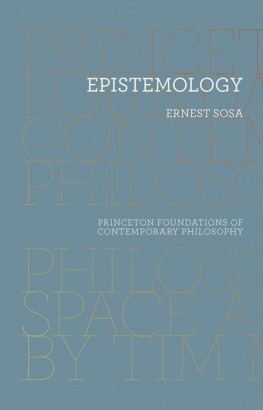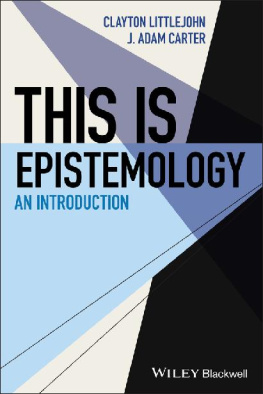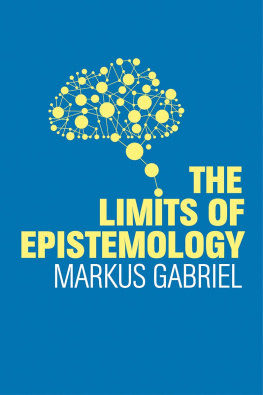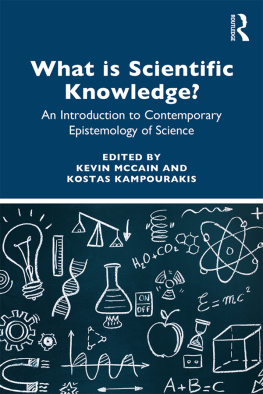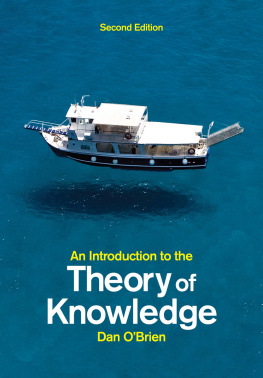
Epistemology
PRINCETON FOUNDATIONS OF CONTEMPORARY PHILOSOPHY
Scott Soames, Series Editor
Philosophical Logic by JOHN P. BURGESS
Philosophy of Language by SCOTT SOAMES
Philosophy of Law by ANDREI MARMOR
Truth by ALEXIS G. BURGESS and JOHN P. BURGESS
Philosophy of Physics: Space and Time by TIM MAUDLIN
Philosophy of Biology by PETER GODFREY-SMITH
Epistemology by ERNEST SOSA
EPISTEMOLOGY
Ernest Sosa
PRINCETON UNIVERSITY PRESS
PRINCETON AND OXFORD
Copyright 2017 by Princeton University Press
Published by Princeton University Press, 41 William Street,
Princeton, New Jersey 08540
In the United Kingdom: Princeton University Press,
6 Oxford Street, Woodstock, Oxfordshire OX20 1TR
press.princeton.edu
All Rights Reserved
ISBN 9780691137490
Library of Congress Control Number: 2016950917
British Library Cataloging-in-Publication Data is available
This book has been composed in Minion Pro and Archer
Printed on acid-free paper.
Printed in the United States of America
10 9 8 7 6 5 4 3 2 1
Contents
CHAPTER ONE
Descartess Pyrrhonian Virtue Epistemology |
CHAPTER TWO
Dream Skepticism |
CHAPTER THREE
Regress Skepticism |
CHAPTER FOUR
Knowledge: What It Is and How We Might Have It |
CHAPTER FIVE
Knowledge as Action |
CHAPTER SIX
Varieties and Levels of Knowledge |
CHAPTER SEVEN
The Value of Human Knowledge |
CHAPTER EIGHT
MindWorld Relations: Action, Perception, Knowledge |
CHAPTER NINE
Two Forms of Virtue Epistemology |
CHAPTER TEN
Knowledge, Time, and Negligence |
CHAPTER ELEVEN
Virtue Theory against Situationism |
CHAPTER TWELVE
Virtue Epistemology and a Theory of Competence |
CHAPTER THIRTEEN
Knowledge and Justification |
Preface for Readers and Instructors
A subplot then welcomes reliable processes of belief formation and sustainment alongside logical inference. These reliable sources are said to include memory and testimony, along with perception. In the expanded picture, these three sources are given standing through their own reliability, with no need to reduce them to any inference based on the subjective given and its phenomenology. We are thus said to attain a broader and more plausible picture of human knowledge and its attainment.
Several available textbooks already lay out that account thoroughly and readably so as to provide an engaging introduction to epistemology so conceived. These provide a fine introduction to modern and contemporary epistemology, including its historical development, and important recent work.
As I argue in the first chapter, that story line misrepresents the father of modern epistemology even in its main plot. The true Cartesian problematic instead goes back to Pyrrhonian epistemology and focuses on skeptical issues more general than that of the external world, that of other minds, that of the past through memory, that of the future through induction, or that of the worlds depth and general structure through inference to the best explanation. These are all important problems, and Descartes did tackle some of them as he came to grips with the more general epistemological problematic of main interest to him, one that also goes back to the schools of ancient Greece.
The first chapter lays out the case for understanding Descartes in the alternative way proposed. The next two chapters step back from such historical detail to a more general understanding of the skeptical problematic found within the Pyrrhonian or Cartesian framework.
More fully understanding that problematic requires closer attention to what sort of belief and what sort of knowledge are mainly of interest to that older tradition. I explore those issues in four central chapters, the fourth through the seventh. These lay out the core of the virtue-theoretic approach, which provides an answer to the Theatetus query as to the nature of knowledge and also to the Meno problem as to its distinctive value. The key elements of that account are the apt belief, whose correctness manifests the competence of the believer, and the fully apt belief, which is guided to aptness by the believers assessment of risk through a competent view of his or her own cognitive skill, shape, and situation.
In the eighth chapter that theoretical structure is seen to bear not only on human knowledge but also on perception and on action, so that all three mindworld relations are illuminated thereby.
With I return to epistemology more narrowly construed. First I take up a received division of virtue epistemology into two camps: one focused on reliability and competence and one on responsibility and character. I argue in this chapter that the dichotomy is false and misleading. A true epistemology will appropriately combine all four elements, and indeed will do so even in its approach to the most traditional issues of skepticism and of the nature and value of knowledge.
takes up a problem from Saul Kripke, his dogmatism paradox. It concludes that, in order to address properly that fascinating puzzle, we need a notion of epistemic negligence that fits naturally within a virtue-theoretic framework like that developed in the earlier chapters.
then develops an account of competence, and of epistemic competence more specifically, in line with our general defense against the situationist attack.
The first twelve chapters thus focus on the nature, value, and extent of human knowledge and on the epistemic virtue or competence that constitutes such knowledge. However, some give pride of place in epistemology to justification rather than knowledge. How, then, is our virtue-theoretic approach to accommodate such justification? A problem is alleged here through a New Evil Demon argument that repurposes the celebrated Cartesian thought experiment. The conclusion is now that the Cartesian scenarios victim can be about as well justified as a normally situated believer, though this is impossible to explain by an externalist epistemology. Our final chapter, the thirteenth, offers a way out for the externalist virtue epistemologist, with implications for the perennial problematic of radical skepticism.
Although the approach to epistemology in this book differs from the familiar approaches of the past several decades, I return to the main epistemological tradition stretching from the Greeks to a German tradition that includes the epistemological writings of Hegel. The main modern protagonist in this narrative is the philosopher often recognized as the founder of modern philosophy and of modern epistemology more specifically. Descartes is that, to be sure, but this must not be allowed to obscure the true content of his philosophy of knowledge, with its ancient sources. The present text tries to illuminate that older tradition and to develop a contemporary account with the same structure while giving it substance, not with theology, as does Descartes, but with science and common sense.
Such a problem of empirical knowledge arises whether on an internally mental foundation or, going now beyond Descartes, on a perceptual external basis. Such foundationalism takes a similar approach to other standard problems of recent and contemporary epistemology: the epistemic problem of other minds, for instance, or that of memory or of testimony.
Next page
